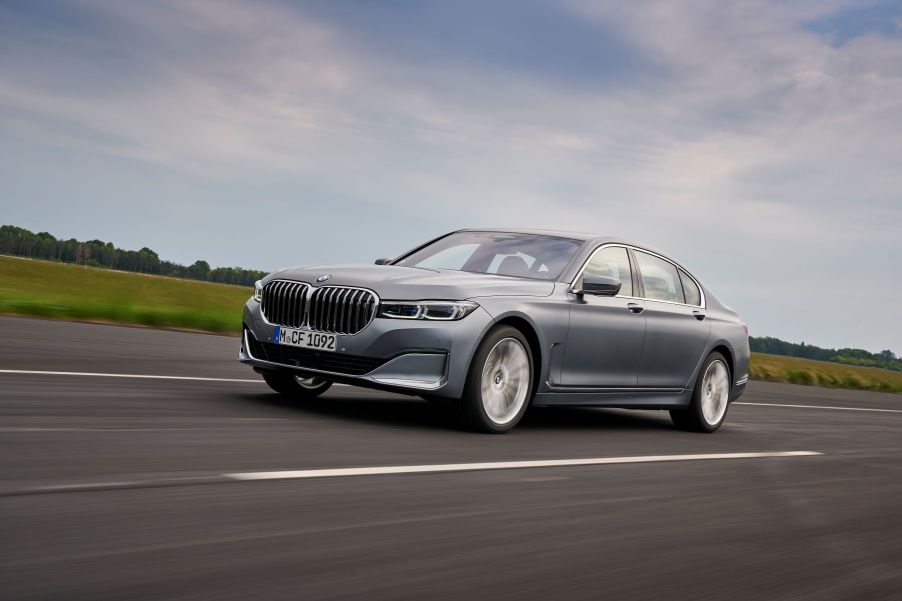
2020 BMW 7 Series: Used Luxury Car Specs, Features, and Most Common Problems
The 2020 BMW 7 Series is a buffet of engine options suitable for even the pickiest consumer. Once you’ve chosen your desired cylinder count, you can enjoy the smooth power delivery cocooned inside an opulent cabin filled to the brim with cutting-edge tech. Let’s explore the decadence of BMW’s flagship sedan and determine whether or not you’ll have to sell your house to keep it on the road.
2020 BMW 7 Series engine options

Most vehicles can be optioned with one or two engines in addition to a hybrid model. The 2020 BMW 7 Series has five, reports Autoblog.
If you want to play it safe, the base 740i and 740i xDrive models come with the wonderful B58. Yes, that is basically the same engine you get in the MK5 Toyota Supra. In the 740i, the 3.0L straight-six produces 335 hp and 330 lb-ft of torque. This will get you to 60 mph in only 5.3 seconds. Not bad for a 4200-lb luxury sedan.
If you want a plug-in hybrid, you can opt for the 745e xDrive. This now pairs the same 3.0L six-cylinder with a 12-kWh lithium-ion battery pack to achieve 330 hp and 389 lb-ft of torque. It’s a little faster, and you’ll get 16 miles of silent EV range. A good option if your neighbors are light sleepers.
If you think a full-size luxury car requires eight cylinders, BMW has you covered. The cheapest way to eight-cylinder heaven is to purchase the 750i xDrive. The V8 in question is a 4.4L turbocharged unit with an astounding 523 hp and 553 lb-ft of torque. Not that the 7 Series buyer would be too concerned with speed, but the 750i manages to reach 60 mph in only 3.9 seconds.
If your answer to the question “how many cylinders do you want?” is YES—BMW, once again, has you covered. All hail the M760i xDrive. Though the 600 hp 6.6L turbocharged V12 might be more than you need, isn’t that what a luxury flagship is all about? Besides, the V12 is going out to pasture soon, so you may as well enjoy that buttery smooth power delivery while you still can.
Luxury at its finest
Think of a feature, and it’s most likely available on the 2020 BMW 7 Series. Inside, you’ll find a 10.25” touchscreen equipped with iDrive, Nappa leather, heated seats and steering wheel, ventilated seats, massage functions, a rear seat entertainment system, and even heated armrests, reports U.S. News. The 7 Series comes standard with a 16-speaker Harman Kardon sound system, but you can upgrade to a 16-speaker Bowers & Wilkins system. Other optional features include a panoramic moonroof and a 12.3” digital gauge cluster screen. Car and Driver reports that the interior is a bit lacking compared to its rivals, the Genesis G90 and Mercedes-Benz S-Class. Still, Autoblog found the materials to be very high quality. Given the 2020 7 Series’ MSRP ranged from $87,445 for the 740i to $158,695 for the M760i, we would expect nothing but the best from BMW.
Is the 7 Series reliable?
The age-old question for the discerning car buyer. Unfortunately, there isn’t a precise answer. Although 2020 feels like it was ages ago, in reality, it’s been no time at all. That is to say, late model reliability is hard to predict. U.S. News reports the 2020 BMW 7 Series J.D Power predicted reliability score is 82 out of 100. That said, there have been six recalls, including an improperly attached fuel pump, that could increase fire risk. Thankfully, this only affects 750i xDrive models. Other recalls include ABS and backup camera failures.
Realistically, these tech-heavy cars are exceptionally expensive to maintain. The 2020 7 Series may be a reasonably reliable car, but maintenance on a $100k luxury/performance flagship sedan will always be costly.
The BMW 7 Series is expensive but awesome
Yes, the BMW 7 Series is expensive to buy, maintain, and repair. However, many publications seem to suggest short-term reliability will be very good. If you have the budget, all the exceptional luxury features and the bevy of engine options make the 7 Series a pretty sweet deal. If you really want to play it safe, the 740i or 740i xDrive equipped with the 3.0L B58 is the way to go. The B58 has proven reliable throughout its lifespan, and with fewer cylinders and more working room in the engine bay, it should pay off in the long term. That said, if you can’t bear to live without a V8 or V12 and an under 4-second 0-60 mph time—we wouldn’t blame you one bit.


